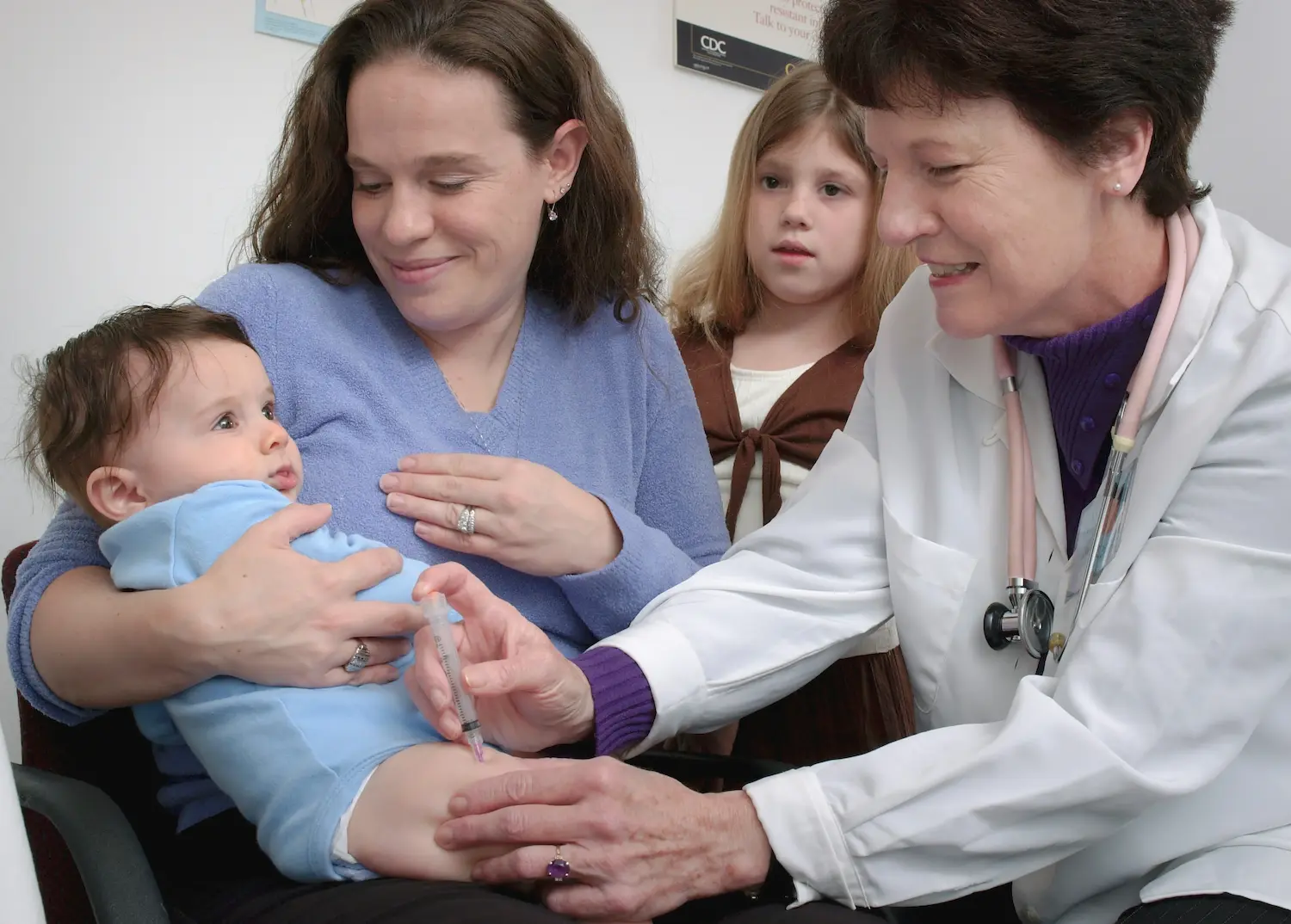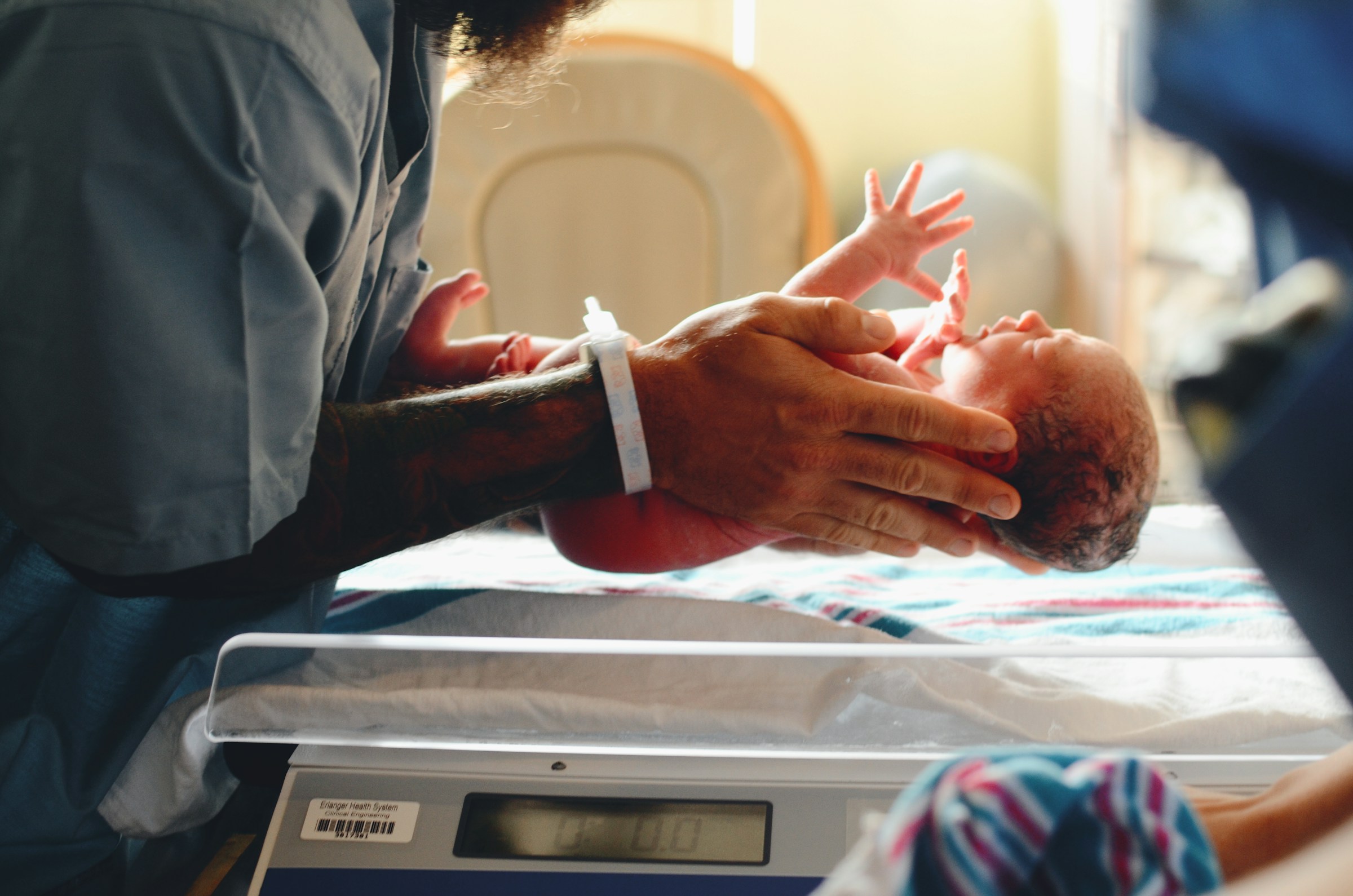2 Month Appointment Shots: Your Baby's Vaccination Guide
2 Month Appointment Shots: Your Baby's Vaccination Guide
For most families, the 2-month appointment is a baby’s first time getting several immunizations at their well-baby checkup. As a parent, you may feel anxious imagining your child in tears from their shots. But rest assured that the childhood immunization schedule is specifically designed with your baby’s immune system in mind, with vaccinations given at appropriate developmental times. After consulting with the expert pediatricians at Summer Health, keep reading to learn which childhood vaccines your baby is scheduled to get at their 2-month appointment, why these vaccines are important, and how to help your baby feel more comfortable in the days following their shots.
For most families, the 2-month appointment is a baby’s first time getting several immunizations at their well-baby checkup. As a parent, you may feel anxious imagining your child in tears from their shots. But rest assured that the childhood immunization schedule is specifically designed with your baby’s immune system in mind, with vaccinations given at appropriate developmental times. After consulting with the expert pediatricians at Summer Health, keep reading to learn which childhood vaccines your baby is scheduled to get at their 2-month appointment, why these vaccines are important, and how to help your baby feel more comfortable in the days following their shots.

Megan N. Freeland, PharmD
Content Writer

Dr. Marcy Borieux
Pediatrician



Why are my baby's 2-month appointment shots important?
Baby’s immune systems aren’t yet mature enough to recognize and fight off many germs, hence the need for vaccinations. Vaccines — or immunizations — help by strengthening your child’s immune system, teaching it to recognize certain germs so they can fight them off completely, or at least avoid getting very sick from them.
While it’s true that babies do get antibodies from their mothers, especially during the second and third trimesters of pregnancy, these maternal antibodies decline over the first few weeks to months of life. The timing of childhood vaccines is intentional and important because even as maternal antibodies start to decline, the babies’ own immune systems are still developing.
Is getting childhood vaccines better for my baby than building up immunity naturally?
There are multiple ways to strengthen the body’s immune system. Building up immunity naturally through exposure to different germs is certainly one way, and getting immunizations to protect against more serious diseases is an effective way to support your baby’s immune system too. An example is the measles vaccine (which needs to be given once more when your child is a teenager to protect them).
In general, it’s better for a child to build up their immunity to serious infections through immunizations rather than by getting exposed to and sick with the infection. Because babies’ immune systems are still developing, many infectious diseases can cause more serious illnesses in babies and young children than in adults.
Getting immunized against those diseases is safer because it helps your baby avoid the possible complications of the disease itself.
What immunizations do infants get at their 2-month appointment?
According to the Centers for Disease Control and Prevention’s childhood immunization schedule, these are the vaccines your child is scheduled to get at their 2-month appointment:
Polio vaccine
Hepatitis B (Hep B) vaccination
Rotavirus vaccine
Haemophilus influenzae type B (Hib) vaccination
Pneumococcal conjugate (PCV) vaccine
Diphtheria/tetanus/pertussis (DTaP) vaccination
It’s worth noting that except for Heptatiteach of these vaccines is the first in a series. PCV is a 2-dose series, given at the 2-month and 4-month appointments. DTaP is a 5-dose series that’s split across 2, 4, and 6 months, then 15 and 18 months. Each of the others in the list is a 3-dose series, given at the 2-month, 4-month, and 6-month appointments.
Your local pediatrician may recommend a different vaccination schedule if your baby has a condition that weakens their immune system.
Inactivated poliovirus vaccine (IPV)
At 2 months, your baby gets their first dose of 4 total immunizations against polio. The poliovirus causes polio, a life-threatening disease that can lead to paralysis and is most common in children under 5. Thanks to the polio vaccine, polio was eradicated in the U.S., and the vaccine remains important for keeping polio risk low.
Hepatitis B vaccination
Babies are scheduled for one Hepatitis B vaccine dose at birth and another at either 1 or 2 months old. Hepatitis B is an infectious disease that can lead to liver damage and liver cancer. Babies can also experience hepatitis B chronically throughout their lives if they’re infected with it at birth.
Rotavirus vaccine
Rotavirus is an infectious disease that can cause watery diarrhea, vomiting, abdominal pain, and dehydration. It can be life-threatening for babies and young children. Depending on the brand, your baby may get 2 or 3 doses of the rotavirus vaccine during childhood. The first dose is scheduled for the 2-month appointment.
Haemophilus influenzae type B (Hib) vaccination
Hib disease is a potentially fatal bacterial infection that most commonly affects children under 5 years old. Hib can cause a life-threatening throat infection known as epiglottitis, meningitis, and sepsis. Depending on the brand, your baby may get 3 or 4 doses of Hib vaccine during childhood.
Pneumococcal conjugate (PCV) vaccine
The pneumococcal vaccine is given across 4 doses between 2 months and 15 months old. This vaccine protects your baby from the Streptococcus pneumoniae bacteria that causes pneumococcal disease. Pneumococcal disease is responsible for many infections, from ear infections to severe, potentially fatal bacterial infections like pneumonia and meningitis.
Diphtheria, tetanus, and pertussis (DTaP) vaccination
Your baby will be scheduled to get 5 doses of the DTaP vaccine between 2 months and 18 months old. DTaP protects against 3 infectious diseases: diphtheria, tetanus, and pertussis (commonly known as whooping cough). Each of these diseases is potentially fatal, and whooping cough in particular can be life-threatening in babies.
RSV vaccine
RSV is a severe respiratory infection that commonly leads to hospitalization for babies and young children and can be life-threatening. RSV season lasts from the fall to the spring.
The CDC recommends that babies under 8 months old who are entering RSV season get one dose of the RSV vaccine if any of the following are true:
The mother did not get the maternal RSV vaccine during pregnancy
The mother’s RSV vaccination status is unknown
The baby was born less than 14 days after the mother got the maternal RSV vaccine
How can I prepare for my baby’s 2-month appointment shots?
There are some things you can do to prepare for your baby’s 2-month appointment shots or any other appointment where they’ll get immunizations. Here are a few suggestions from Summer Health pediatrician Dr. Marcy:
Dress your baby in comfortable clothing, such as a short onesie for vaccination appointments
Bring a favorite toy or lovey to help distract them during or after the vaccines.
Bring a favorite pacifier to provide comfort during or after the vaccines.
Plan to sing or play your baby’s favorite song.
Plan to nurse or bottle-feed your baby immediately after their shots.
How do I care for my baby after their 2-month appointment shots?
On the day your baby gets shots, and even a few days later, they may be uncomfortable. For example common post-vaccination effects can be:
Soreness or mild redness at the site where your baby got their vaccine
More naps than usual
Fussiness
Fever, soreness, redness, and fatigue are all signs that the immunization is working. Remember: the job of vaccines is to teach the immune system how to respond to foreign and potentially dangerous germs. The vaccination side effects are signs that your baby’s immune system is learning how to respond in order to fight off these germs if they are exposed to them in the future.
For this reason, it’s no longer recommended to pre-treat your baby with fever medications like acetaminophen (Tylenol) before or after their vaccines since this can affect how well the vaccine works.
Even a low-grade fever doesn’t need to be treated if your baby is otherwise comfortable and feeding well. However, if a fever is causing your baby significant discomfort, you may use the appropriate fever medication as needed.
If your baby has just received vaccinations and you’re wondering whether or how to treat their fever or other symptoms, you can always text a Summer Health pediatrician to get specific advice.
Why are my baby's 2-month appointment shots important?
Baby’s immune systems aren’t yet mature enough to recognize and fight off many germs, hence the need for vaccinations. Vaccines — or immunizations — help by strengthening your child’s immune system, teaching it to recognize certain germs so they can fight them off completely, or at least avoid getting very sick from them.
While it’s true that babies do get antibodies from their mothers, especially during the second and third trimesters of pregnancy, these maternal antibodies decline over the first few weeks to months of life. The timing of childhood vaccines is intentional and important because even as maternal antibodies start to decline, the babies’ own immune systems are still developing.
Is getting childhood vaccines better for my baby than building up immunity naturally?
There are multiple ways to strengthen the body’s immune system. Building up immunity naturally through exposure to different germs is certainly one way, and getting immunizations to protect against more serious diseases is an effective way to support your baby’s immune system too. An example is the measles vaccine (which needs to be given once more when your child is a teenager to protect them).
In general, it’s better for a child to build up their immunity to serious infections through immunizations rather than by getting exposed to and sick with the infection. Because babies’ immune systems are still developing, many infectious diseases can cause more serious illnesses in babies and young children than in adults.
Getting immunized against those diseases is safer because it helps your baby avoid the possible complications of the disease itself.
What immunizations do infants get at their 2-month appointment?
According to the Centers for Disease Control and Prevention’s childhood immunization schedule, these are the vaccines your child is scheduled to get at their 2-month appointment:
Polio vaccine
Hepatitis B (Hep B) vaccination
Rotavirus vaccine
Haemophilus influenzae type B (Hib) vaccination
Pneumococcal conjugate (PCV) vaccine
Diphtheria/tetanus/pertussis (DTaP) vaccination
It’s worth noting that except for Heptatiteach of these vaccines is the first in a series. PCV is a 2-dose series, given at the 2-month and 4-month appointments. DTaP is a 5-dose series that’s split across 2, 4, and 6 months, then 15 and 18 months. Each of the others in the list is a 3-dose series, given at the 2-month, 4-month, and 6-month appointments.
Your local pediatrician may recommend a different vaccination schedule if your baby has a condition that weakens their immune system.
Inactivated poliovirus vaccine (IPV)
At 2 months, your baby gets their first dose of 4 total immunizations against polio. The poliovirus causes polio, a life-threatening disease that can lead to paralysis and is most common in children under 5. Thanks to the polio vaccine, polio was eradicated in the U.S., and the vaccine remains important for keeping polio risk low.
Hepatitis B vaccination
Babies are scheduled for one Hepatitis B vaccine dose at birth and another at either 1 or 2 months old. Hepatitis B is an infectious disease that can lead to liver damage and liver cancer. Babies can also experience hepatitis B chronically throughout their lives if they’re infected with it at birth.
Rotavirus vaccine
Rotavirus is an infectious disease that can cause watery diarrhea, vomiting, abdominal pain, and dehydration. It can be life-threatening for babies and young children. Depending on the brand, your baby may get 2 or 3 doses of the rotavirus vaccine during childhood. The first dose is scheduled for the 2-month appointment.
Haemophilus influenzae type B (Hib) vaccination
Hib disease is a potentially fatal bacterial infection that most commonly affects children under 5 years old. Hib can cause a life-threatening throat infection known as epiglottitis, meningitis, and sepsis. Depending on the brand, your baby may get 3 or 4 doses of Hib vaccine during childhood.
Pneumococcal conjugate (PCV) vaccine
The pneumococcal vaccine is given across 4 doses between 2 months and 15 months old. This vaccine protects your baby from the Streptococcus pneumoniae bacteria that causes pneumococcal disease. Pneumococcal disease is responsible for many infections, from ear infections to severe, potentially fatal bacterial infections like pneumonia and meningitis.
Diphtheria, tetanus, and pertussis (DTaP) vaccination
Your baby will be scheduled to get 5 doses of the DTaP vaccine between 2 months and 18 months old. DTaP protects against 3 infectious diseases: diphtheria, tetanus, and pertussis (commonly known as whooping cough). Each of these diseases is potentially fatal, and whooping cough in particular can be life-threatening in babies.
RSV vaccine
RSV is a severe respiratory infection that commonly leads to hospitalization for babies and young children and can be life-threatening. RSV season lasts from the fall to the spring.
The CDC recommends that babies under 8 months old who are entering RSV season get one dose of the RSV vaccine if any of the following are true:
The mother did not get the maternal RSV vaccine during pregnancy
The mother’s RSV vaccination status is unknown
The baby was born less than 14 days after the mother got the maternal RSV vaccine
How can I prepare for my baby’s 2-month appointment shots?
There are some things you can do to prepare for your baby’s 2-month appointment shots or any other appointment where they’ll get immunizations. Here are a few suggestions from Summer Health pediatrician Dr. Marcy:
Dress your baby in comfortable clothing, such as a short onesie for vaccination appointments
Bring a favorite toy or lovey to help distract them during or after the vaccines.
Bring a favorite pacifier to provide comfort during or after the vaccines.
Plan to sing or play your baby’s favorite song.
Plan to nurse or bottle-feed your baby immediately after their shots.
How do I care for my baby after their 2-month appointment shots?
On the day your baby gets shots, and even a few days later, they may be uncomfortable. For example common post-vaccination effects can be:
Soreness or mild redness at the site where your baby got their vaccine
More naps than usual
Fussiness
Fever, soreness, redness, and fatigue are all signs that the immunization is working. Remember: the job of vaccines is to teach the immune system how to respond to foreign and potentially dangerous germs. The vaccination side effects are signs that your baby’s immune system is learning how to respond in order to fight off these germs if they are exposed to them in the future.
For this reason, it’s no longer recommended to pre-treat your baby with fever medications like acetaminophen (Tylenol) before or after their vaccines since this can affect how well the vaccine works.
Even a low-grade fever doesn’t need to be treated if your baby is otherwise comfortable and feeding well. However, if a fever is causing your baby significant discomfort, you may use the appropriate fever medication as needed.
If your baby has just received vaccinations and you’re wondering whether or how to treat their fever or other symptoms, you can always text a Summer Health pediatrician to get specific advice.
References
Centers for Disease Control and Prevention. Immunization Schedules. https://www.cdc.gov/vaccines/schedules/easy-to-read/child-easyread.html
Centers for Disease Control and Prevention. Vaccines at 1 to 2 Months. https://www.cdc.gov/vaccines/parents/by-age/months-1-2.html
Centers for Disease Control and Prevention. Immunization Schedules. https://www.cdc.gov/vaccines/schedules/easy-to-read/child-easyread.html
Centers for Disease Control and Prevention. Vaccines at 1 to 2 Months. https://www.cdc.gov/vaccines/parents/by-age/months-1-2.html
Centers for Disease Control and Prevention. Immunization Schedules. https://www.cdc.gov/vaccines/schedules/easy-to-read/child-easyread.html
Centers for Disease Control and Prevention. Vaccines at 1 to 2 Months. https://www.cdc.gov/vaccines/parents/by-age/months-1-2.html
Summer Health offers fast and reliable pediatric urgent care through online doctors, all via text. Whether you’re worried about your baby's fever, rashes, or other children's health concerns, we provide expert advice and support anytime, right from your phone.

Never miss a post!
Sign up for our newsletter to receive articles and guides directly to your inbox!














